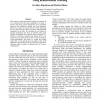Free Online Productivity Tools
i2Speak
i2Symbol
i2OCR
iTex2Img
iWeb2Print
iWeb2Shot
i2Type
iPdf2Split
iPdf2Merge
i2Bopomofo
i2Arabic
i2Style
i2Image
i2PDF
iLatex2Rtf
Sci2ools
140
click to vote
FLAIRS
2004
2004
Developing Task Specific Sensing Strategies Using Reinforcement Learning
Robots that can adapt and perform multiple tasks promise to be a powerful tool with many applications. In order to achieve such robots, control systems have to be constructed that have the capability to handle real world situations. Robots use sensors to interact with the world. Processing the raw data from these sensors becomes computationally intractable in real time. This problem can be tackled by learning mechanisms for focus of attention. This paper presents an approach that considers focus of attention as a problem of selecting controller and feature pairs to be processed at any given point of time in order to optimize system performance. The result is a control and sensing policy that is task specific and can adapt to real world situations using feedback from the world. The approach is illustrated using a number of different tasks in a blocks world domain.
Related Content
| Added | 30 Oct 2010 |
| Updated | 30 Oct 2010 |
| Type | Conference |
| Year | 2004 |
| Where | FLAIRS |
| Authors | Srividhya Rajendran, Manfred Huber |
Comments (0)

